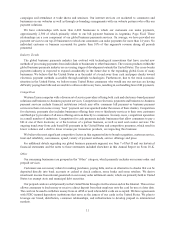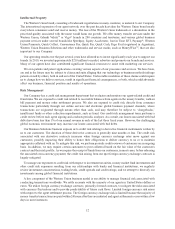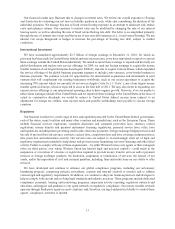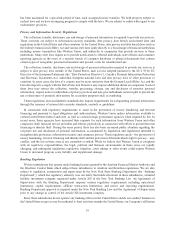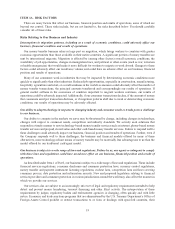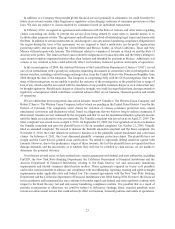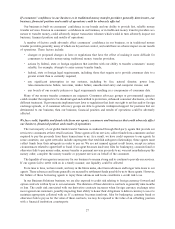Western Union 2010 Annual Report Download - page 23
Download and view the complete annual report
Please find page 23 of the 2010 Western Union annual report below. You can navigate through the pages in the report by either clicking on the pages listed below, or by using the keyword search tool below to find specific information within the annual report.Thus, the risk of adverse regulatory action against Western Union because of actions by its agents and their
subagents in those areas has increased. These changes could result in increased costs to comply with the new
requirements, or in the event we or our agents or their subagents are unable to comply, could have an adverse impact
on our business, financial position and results of operations. These laws could also increase competition in some or
all of our areas of service. Additional countries are likely to adopt legislation similar to these laws.
Our fees and/or foreign exchange spreads may be reduced or limited because of regulatory initiatives or
proceedings that are either industry wide or specifically targeted at our Company. For example, initiatives both in
the United States and at G-8 summit meetings have focused on lowering international remittance costs. Also,
Pakistan subsidizes certain remittances into the country from Pakistanis working abroad. Remittance companies
accepting the subsidy are prohibited from charging fees to the sender or receiver. Such initiatives may have an
adverse impact on our business, financial position and results of operations.
In 2009, one state passed a law imposing a fee on certain money transfer transactions, and certain other states
have recently proposed similar legislation. Although money transfer services themselves are not generally subject to
sales tax on money transfer services elsewhere in the United States, the current budget shortfalls in many
jurisdictions, combined with continued federal inaction on comprehensive immigration reform, may lead other
states or localities to impose similar taxes or fees. A tax or fee exclusively on money transfer services like Western
Union could put us at a competitive disadvantage to other means of remittance which are not subject to the same
taxes or fees.
We are subject to regulations imposed by the Foreign Corrupt Practices Act (the “FCPA”) in the United States
and similar laws in other countries, such as the Bribery Act in the United Kingdom, which generally prohibit
companies and those acting on their behalf from making improper payments to foreign government officials for the
purpose of obtaining or retaining business. Some of these laws also prohibit commercial bribery. Because our
services are offered in virtually every country of the world, we face a higher risk associated with FCPA and United
Kingdom Bribery Act compliance than many other companies. Any determination that we have violated these laws
could have an adverse effect on our business, financial position and results of operations.
We are subject to unclaimed or abandoned property (escheat) laws in the United States and abroad which require
us to turn over to certain government authorities the property of others held by us that has been unclaimed for a
specified period of time, such as unpaid money transfers. We hold property subject to escheat laws and we have an
ongoing program to comply with those laws. In addition, we are subject to audits with regard to our escheatment
practices. Any difference between the amounts we have accrued for unclaimed property and amounts that are
claimed by a state or foreign jurisdiction could have a significant impact on our results of operations and cash flows.
See “—Escheat Regulations” for further discussion.
Our business is subject to various United States federal, state and local laws and regulations, as well as laws and
regulations outside the United States. Our United States business is subject to reporting, recordkeeping and anti-
money laundering provisions of the Bank Secrecy Act, as amended by the USA PATRIOT Act of 2001, and to
regulatory oversight and enforcement by the United States Department of the Treasury Financial Crimes
Enforcement Network, or “FinCEN.” In addition, as a money transmitter, we are subject to licensing,
regulation and examination by almost all the states and the District of Columbia. With the advent of the EU
PSD and similar legislation in Japan, we have become directly subject to reporting, recordkeeping and anti-money
laundering regulations in those places. Our business in the EU is now subject to licensing, regulation and
examination by regulators in Ireland and the United Kingdom. We are also now subject to such oversight in
Japan. If additional countries adopt similar money transfer legislation, we could become subject to licensing,
regulation and examination in those locations, as well. Further, we have subsidiaries that are subject to banking
regulations, primarily those in Brazil and Austria. These subsidiaries are also subject to regulation, examination and
supervision by the New York State Banking Department. Any determination that we have violated these laws and
regulations could have an adverse effect on our business, financial position and results of operations.
The remittance industry has come under increasing scrutiny from government regulators and others in
connection with its ability to prevent its services from being abused by people seeking to defraud others. In
2009, a competitor of Western Union entered into a multi-year, multi-million dollar settlement with the Federal
Trade Commission over this issue. While we believe our fraud prevention efforts are effective and comply with
21


